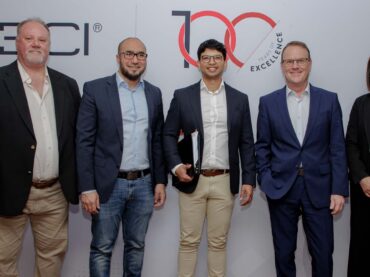- View All
- Company News
- Q&A
3rd October 2025
We are proud of the support we offer customers working to maintain our municipal roads. It’s a big job and we hope we can help contractors to produce asphalt road surfaces that stand the test of time. Read about how we form enduring relationships with these customers in the latest issue of IMIESA.
6th November 2024
Old Mutual Private Equity (OMPE) and Sphere Investments (Sphere) have announced they have concluded an agreement with Johannesburg Stock Exchange listed AECI Limited to acquire 100% of Much Asphalt alongside the Much Asphalt Management team. The deal is valued at ZAR 1.05 billion and will be financed through a combination of debt and equity. Much Asphalt is South Africa’s largest commercial manufacturer of asphalt products and bituminous binders and emulsions, the latter supplied by SprayPave, a division of Much Asphalt, which are principally used in the road surfacing industry. The company has an unrivalled national footprint, the only player with a nationwide presence which, combined with Much Asphalt’s high levels of service, consistency of supply, reputation and quality of product, further strengthens its offering. OMPE and Sphere believe an investment in the country’s road infrastructure, a key enabler of economic growth and job creation, aligns with the objectives of the Government of National Unity. This, combined with Much Asphalt’s strong competitive offering, means that the company is well-positioned to play a meaningful role in South Africa’s road infrastructure spend over the medium to long term. This transaction marks the first and anchor investment in the newly launched OMPE Fund VI. OMPE and Sphere will partner with the Much Asphalt management team over the investment tenure and through stewardship, capital and perspective, seek to generate transformative growth and business transformation to provide an attractive return to investors and contribute meaningfully to the lives of the employees and communities within which Much Asphalt operates. Jacci Myburgh, Co-Head of OMPE said: “We have confidence in the infrastructure repair initiatives under the new South African Government and actively look to invest behind sectors that we think will recover back to more normal levels over the medium to long term, compared to a volatile and abnormal last ten years for the South African economy. An effective road network is critical to the exciting re-build that is underway in South Africa, which should stimulate economic growth and lead to the creation of new jobs. Burchert Johannes, Investment Principal at OMPE said: “Much Asphalt has a deeply experienced, best-in-class management team. Their experience, technical knowledge and commerciality has seen the company successfully navigate through several industry cycles and we look forward to partnering with them and Sphere to grow the business.” Mohammed Sabi, Director at Sphere, said: “Road infrastructure plays a pivotal role in enabling economic development, connecting South Africans and empowering previously disadvantaged communities in isolated parts of our country. Our investment in Much Asphalt is a continuation of our 21-year track record of investing in high quality business which supply critical goods and services to their customers. We look forward to working with OMPE and the management team to unlock the growth opportunities available to the business in both South Africa and the broader SADC region.” Bennie Greyling, Managing Director of Much Asphalt said: “We have built a solid business that is well-placed to benefit from the catch-up in the road infrastructure spend backlog in the country. We look forward to the next chapter in our business growth through the partnership with Old Mutual Private Equity and Sphere, two highly respected financial investors in the South African landscape.” The transaction is expected to close during the first quarter of 2025, subject to customary regulatory approvals. ABOUT OLD MUTUAL PRIVATE EQUITY Old Mutual Private Equity, part of Old Mutual Alternative Investments, is one of the largest and most established private equity managers in South Africa with a 24-year heritage of being a significant investor in privately owned businesses across key industries and sectors. OMPE has invested in some of South Africa’s strongest private businesses, including Actom, Tourvest, Ti-Auto, Primedia, In2Food and 10x. We have deployed more than R12 billion across 37 transactions, delivering R34 billion in value, including R21.5 billion across 26 exits and R12.4 billion in remaining value. OMPE has also been involved in some of the landmark private equity transactions in South Africa over the years, including some of the largest PE delistings from the Johannesburg Stock Exchange (Pepkor, Consol Glass, Long4Life) and some of the largest PE exits, including the IPO of Life Healthcare. OMPE is currently raising and deploying its sixth fund, OMPE Fund VI. ABOUT SPHERE Established in October 2003, Sphere is a leading Black investment holding company. The cornerstone of Sphere’s approach to making investments is one of partnership: we seek to forge strong alliances and work together with management teams and co-shareholders to build tangible value over the long term. Over its history, Sphere has successfully partnered with the South African subsidiaries of major global multinationals including Babcock International Group PLC, Honeywell International Inc, and Pearson PLC, and assembled a diversified portfolio of exceptional assets in the engineering and infrastructure maintenance, custom software, industrial and education sectors.




